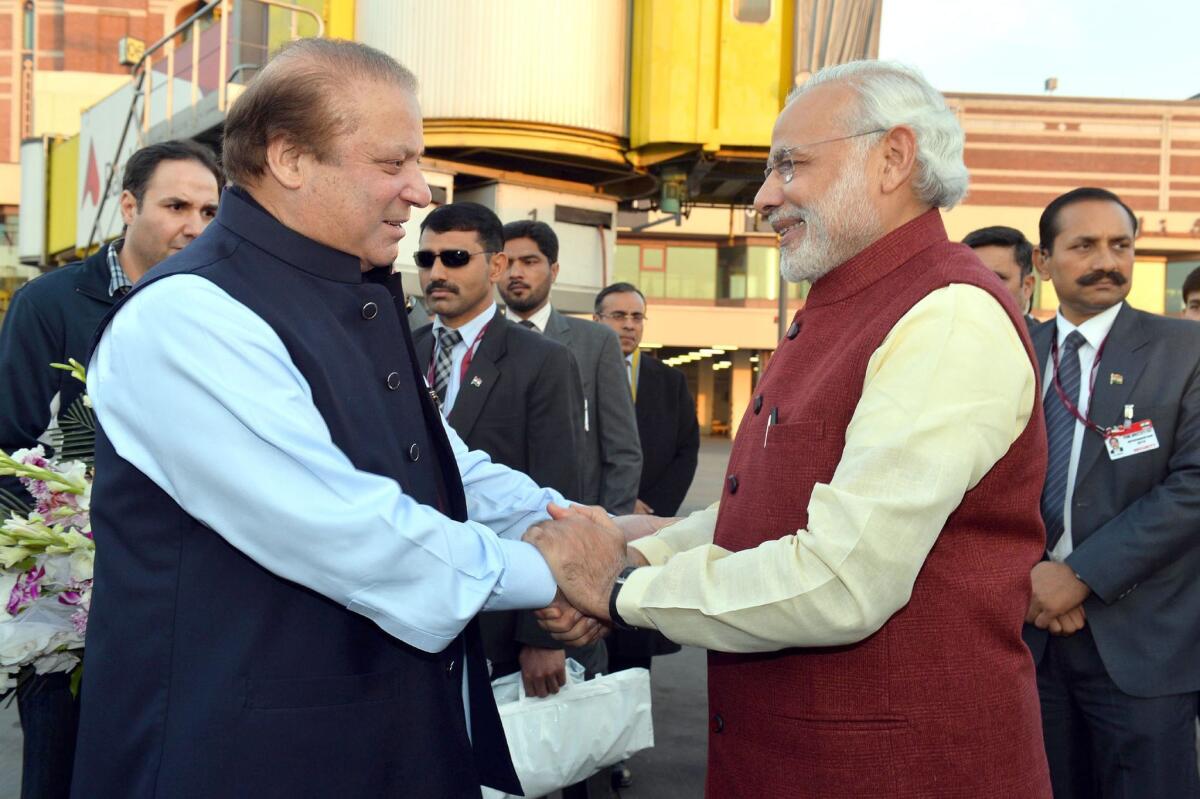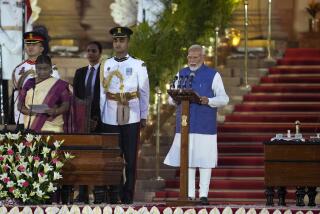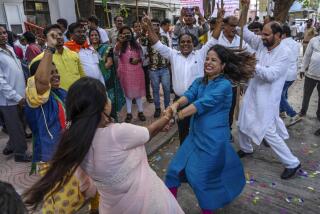Indian Prime Minister Narendra Modi’s visit to Pakistan sets the stage for talks next month

Pakistani Prime Minister Nawaz Sharif, left, welcomes Indian Prime Minister Narendra Modi at the airport in Lahore, Pakistan, on Friday. Modi made a surprise stopover in the first visit by an Indian prime minister to Pakistan since 2004.
reporting from ISLAMABAD, Pakistan — With a surprise visit to Pakistan, Indian Prime Minister Narendra Modi on Friday breathed new life into a long troubled relationship.
Weeks before the reopening of high-level talks between the nuclear-armed rivals, Modi became the first Indian premier in more than a decade to set foot in Pakistan. When he and Pakistani Prime Minister Nawaz Sharif embraced at the airport in the eastern city of Lahore, it immediately set tongues wagging in both countries.
The feel-good moment belied the tensions between the two countries that have worsened in the 19 months since Modi came to power. His conservative government signaled a more muscular Indian foreign policy, but it thus far had not shown a fresh approach to achieving peace with Pakistan.
As diplomatic theater, the meeting could hardly have been more colorful: Modi announced the visit on Twitter en route from an official visit to Afghanistan. His stopover coincided with Sharif’s birthday and wedding celebrations for his granddaughter, and the men flew by helicopter to Sharif’s family residence in Raiwind, which was grandly festooned for the wedding.
“Spent a warm evening with Sharif family at their family home,” Modi tweeted afterward. “Nawaz Sahab’s birthday & granddaughter’s marriage made it a double celebration.”
See more of our top stories on Facebook >>
Pakistani Foreign Secretary Aizaz Chaudhury described it as “a goodwill visit” that helped pave the ground for a highly anticipated meeting in January between the countries’ top diplomats.
“The two sides decided to understand each other’s reservations and restart the comprehensive dialogue in a positive manner,” Chaudhury said.
The countries, which were cleaved in 1947 upon independence from Britain, have fought four wars and countless minor skirmishes, while maintaining one of the most heavily militarized borders in the world. In recent months, each side has accused the other’s military of firing across the border without provocation.
The conflict has had broader implications as the rivals jockey for influence elsewhere in South Asia, particularly in Afghanistan.
Friday’s meeting, however, was the latest in a recent series of signs of potentially thawing relations.
The fact that Modi stopped in Pakistan after an official visit to Kabul, where he helped open a new, Indian-constructed parliament building, was seen as significant because Pakistan has often chafed at Indian engagement in Afghanistan.
Modi and Sharif also had a brief encounter last month on the sidelines of the U.N. climate change conference in Paris, after which the countries’ national security advisors met in Bangkok, Thailand, for discussions on terrorism, the disputed Kashmir territory and other issues, officials said.
In October, Pakistani officials brought a deaf-and-mute woman home to India 15 years after she had unwittingly strayed across the border as a girl.
Analysts said Modi appears willing to endure criticism from hard-liners within his own Bharatiya Janata Party who oppose outreach to Pakistan, which they accuse of harboring Islamist militant groups that have frequently attacked India.
Indian officials also have repeatedly accused Islamabad of stalling the trial of suspects in the 2008 terrorist attacks in Mumbai, India’s financial hub.
“Modi’s surprise visit to Pakistan underscores his reputation as a bold leader willing to break the mold in foreign policy even at the risk of alienating some of his core supporters at home,” said Sadanand Dhume, resident fellow at the American Enterprise Institute in Washington.
At next month’s meeting, the countries’ foreign secretaries are expected to restart a so-called comprehensive dialogue that includes mundane commercial and cultural exchanges as well as thorny boundary issues and terrorism. The talks were twice put on ice over Indian objections to Pakistani officials meeting with separatists from the Indian-controlled portion of Kashmir.
Expectations for the talks have been growing in Pakistan since Sharif appointed a recently retired army general, Nasir Janjua, as his national security advisor and gave him a key role in the dialogue process. The move was seen as a sign that Pakistan’s powerful military supported the diplomatic push.
“No dialogue project with India can succeed without the support of the military establishment,” said Baqar Sajjad, a senior journalist in Islamabad who has covered Pakistani foreign affairs for more than a decade.
The visit also appeared to be an effort by the media-savvy Modi to score positive headlines after a punishing few months at home, including his party’s defeat in an important state election and allegations that some BJP Hindu leaders were fueling religious strife with provocative comments against minority Muslims.
Top officials in both countries said the meeting was a closely kept secret. Pakistan’s foreign affairs ministry spokesman claimed he learned of the visit from Modi’s tweet. Adding to the theatrics, Friday also was the birthday of Muhammad Ali Jinnah, the founder of Pakistan, and Atal Bihari Vajpayee, the last Indian prime minister who traveled to Pakistan, in 2004, and was widely credited with repairing ties between the countries.
The Modi-Sharif encounter created a sensation that many analysts said had changed the atmosphere for next month’s dialogue.
“An unusually large part of India-Pakistan relations is propelled by atmospherics, so the Modi visit will undoubtedly give both urgency and purpose” to the talks, Dhume said. “Of course, we’ve seen this movie before, so I’m not holding my breath for a breakthrough.”
Sahi is a special correspondent. Times staff writer Bengali reported from Ahmedabad, India.
ALSO:
What’s behind the Taliban onslaught in Afghanistan?
Deadly bomb rips through Pakistan market
Indian fisherman’s death points up perils of straying into disputed waters
More to Read
Sign up for Essential California
The most important California stories and recommendations in your inbox every morning.
You may occasionally receive promotional content from the Los Angeles Times.










